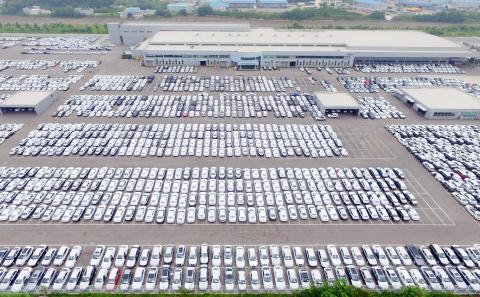South Korea yesterday suspended sales of most Volkswagen AG (VW) models in a fresh blow to the German automaker as it struggles to overcome the global repercussions of its emissions-test cheating scandal and rebuild its tattered image.
The government revoked certification for 80 model variants of VW, Audi and Bentley vehicles, and fined Volkswagen 17.8 billion won (US$16.06 million) for allegedly forging documents on emissions or noise-level tests.
The move could slam the brakes on sales for Europe’s biggest automaker in the Asian market, where its local unit had more than tripled revenue to 2.82 trillion won over the past five years before becoming mired in the emissions scandal.

Photo: AP
Volkswagen described the ruling as “most severe” and said it would consider a legal challenge.
In all, 209,000 VW vehicles have been decertified in South Korea, mainly over emissions-related problems, since November last year — or 68 percent of the vehicles the automaker had sold in the country since 2007, the South Korean Ministry of Environment said.
While South Korea is a relatively small market for Volkswagen, it is a major market for its luxury marques Audi and Bentley and one of the fastest-growing markets for all brands.
It could take more than three months for the affected brands to be back on showroom floors, officials said.
“It usually takes three months for vehicle certification, but this may take longer for Volkswagen, as we will take thorough steps,” ministry Director Hong Dong-gon told reporters.
The ministry said it might need more time to carry out thorough inspection and visit Volkswagen’s German headquarters, if necessary.
Any delay in recalls previously ordered over emissions test manipulation could be met with an order for VW to exchange those vehicles for other models, Hong added.
Audi Volkswagen Korea Ltd is working together with the authorities on a quick resolution to the vehicle-standards irregularities as well as a full accounting of them, VW spokeswoman Leslie Bothge said.
However, in a letter to customers posted on its South Korean homepage, Volkswagen also said it would consider requesting an “injunction of execution.”
It also could take legal action against the government’s decision “if this will help recover our company’s business reputation and benefit our consumers, dealers and other partners,” it added.
Volkswagen voluntarily halted sales of most of its models in South Korea from Monday last week, ahead of the government’s decision.
The company reported a 12 percent drop in quarterly profit at its main passenger car division last week, showing the challenges it still faces since admitting in September last year to using software to falsify pollution tests on some diesel cars.
In addition to billions of dollars in costs related to the scandal, it is also tangled in legal action in the US, Germany, South Korea and elsewhere.
Additional reporting by Bloomberg

Merida Industry Co (美利達) has seen signs of recovery in the US and European markets this year, as customers are gradually depleting their inventories, the bicycle maker told shareholders yesterday. Given robust growth in new orders at its Taiwanese factory, coupled with its subsidiaries’ improving performance, Merida said it remains confident about the bicycle market’s prospects and expects steady growth in its core business this year. CAUTION ON CHINA However, the company must handle the Chinese market with great caution, as sales of road bikes there have declined significantly, affecting its revenue and profitability, Merida said in a statement, adding that it would

RISING: Strong exports, and life insurance companies’ efforts to manage currency risks indicates the NT dollar would eventually pass the 29 level, an expert said The New Taiwan dollar yesterday rallied to its strongest in three years amid inflows to the nation’s stock market and broad-based weakness in the US dollar. Exporter sales of the US currency and a repatriation of funds from local asset managers also played a role, said two traders, who asked not to be identified as they were not authorized to speak publicly. State-owned banks were seen buying the greenback yesterday, but only at a moderate scale, the traders said. The local currency gained 0.77 percent, outperforming almost all of its Asian peers, to close at NT$29.165 per US dollar in Taipei trading yesterday. The

RECORD LOW: Global firms’ increased inventories, tariff disputes not yet impacting Taiwan and new graduates not yet entering the market contributed to the decrease Taiwan’s unemployment rate last month dropped to 3.3 percent, the lowest for the month in 25 years, as strong exports and resilient domestic demand boosted hiring across various sectors, the Directorate-General of Budget, Accounting and Statistics (DGBAS) said yesterday. After seasonal adjustments, the jobless rate eased to 3.34 percent, the best performance in 24 years, suggesting a stable labor market, although a mild increase is expected with the graduation season from this month through August, the statistics agency said. “Potential shocks from tariff disputes between the US and China have yet to affect Taiwan’s job market,” Census Department Deputy Director Tan Wen-ling

UNCERTAINTIES: The world’s biggest chip packager and tester is closely monitoring the US’ tariff policy before making any capacity adjustments, a company official said ASE Technology Holding Inc (日月光投控), the world’s biggest chip packager and tester, yesterday said it is cautiously evaluating new advanced packaging capacity expansion in the US in response to customers’ requests amid uncertainties about the US’ tariff policy. Compared with its semiconductor peers, ASE has been relatively prudent about building new capacity in the US. However, the company is adjusting its global manufacturing footprint expansion after US President Donald Trump announced “reciprocal” tariffs in April, and new import duties targeting semiconductors and other items that are vital to national security. ASE subsidiary Siliconware Precision Industries Co (SPIL, 矽品精密) is participating in Nvidia